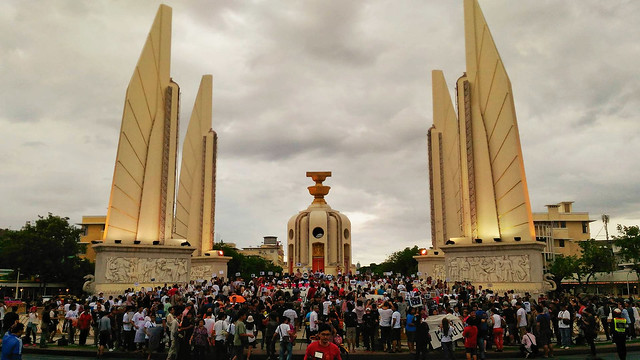Considering the climate of fear and repression, the success of a protest march commemorating the 2014 coup has raised questions about the government crackdown on political discussion. Although answers differ, it can be agreed that the presence of the event is a good sign.
On Sunday, 22 May 2016, in the late afternoon, hundreds of people gathered at Thammasat University to peacefully march to the Democracy Monument on Rajdamnoen Avenue, in commemoration of the coup d’etat happening exactly two years earlier. Authorities were notified in advance, and permission was granted.
This event occurred in a much different manner than the attempt of a similar event last year, where about 50 students and activists were arrested from at least three different demonstrations that protested the 2014 coup.
This year’s demonstrations were met with a different response. The presence of military and police was still apparent, but seemingly less so in a repressive way. Alongside assuring protesters safely cross streets, as seen here, the only intervention of the day involved breaking up a confrontation involving a heckling pro-military group.

Protesters march to Democracy Monument to mark the second anniversary of the coup.
Rangsiman Rome, leader of the New Democracy Movement, told Prachatai English that he believes the allowance of events, like last Sunday’s march, may signify a changing mindset in the junta, stating that since July of last year, the NDM has successfully held events without issues with authorities or arrests.
Rangsiman also considered the impact of the international pressure that Thailand has recently endured from the UN Universal Periodic Review. With a significant number of countries showing concern for the state of freedom of expression about the upcoming referendum, and in general, the junta may be allowing events like this to occur to satisfy the concerns.
Sunai Phasuk of Human Rights Watch Thailand, who was at Sunday’s march, was not as optimistic about the commemorative march, however.
Sunai believes it is too early to confirm that the military is okay with these demonstrations. He is concerned that the abundance of photos and footage of the event also serves as a wealth of evidence, should the government seek reprisal of participants in the future.
“The overall trend of repression is still going on with no end in sight,” said Sunai. “The junta is selective in what issues are sensitive to them.” Last year on 22 May, the sensitive issue was the coup, this year it is the referendum.
Yingcheep Atchanont, programme manager of iLaw and an attendee Sunday’s march, believes that the government allowed the march because “[the NDM] cannot go any further than this.” Meaning that the NDM and a group of a couple hundred people, with their already apparent public opinions, cannot overthrow the regime.
He further suggested that, had the government decided to crack down on the protestors, it likely would have caused more publicity, and thus more criticism on the already poor human rights performance of the junta.
Although this analysis of last Sunday’s march is not entirely hopeful, there may be a silver lining. The very fact that events like this have, and likely will continue to occur, means the flame of democracy will not be blown out by the gales of repression.
It is apparent that Rangsiman and the NDM still fight, regardless of the barriers and odds. Sunai and Yingcheep also find value in this fight, regardless of whether Sunday’s march was highly impactful or not.
For Sunai, the most significant aspect of Sunday’s march was that the majority of the protestors were not political or movement leaders, although there were many there, but rather they were “Aunties, uncles, housewives, and other everyday people” who have consistently shown up to events like this since the day after the coup took place. What this shows is that people are not afraid, and will continue to fight to keep democracy alive, regardless of the repression.
Yingcheep additionally commented on Sunday’s event saying that “I think it is a good sign, for some aspects, that the military let people campaign on their issues rather than prohibit it. It is possible for others to have activities like this, which would be good to see leading up to the referendum vote.”

